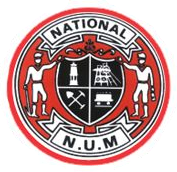Related Research Articles

The Transport and General Workers' Union was one of the largest general trade unions in the United Kingdom and Ireland – where it was known as the Amalgamated Transport and General Workers' Union (ATGWU) to differentiate itself from the Irish Transport and General Workers' Union – with 900,000 members. It was founded in 1922 and Ernest Bevin served as its first general secretary.

The National Union of Mineworkers (NUM) is a trade union for coal miners in Great Britain, formed in 1945 from the Miners' Federation of Great Britain (MFGB). The NUM took part in three national miners' strikes, in 1972, 1974 and 1984–85. Following the 1984–85 strike, and the subsequent closure of most of Britain's coal mines, it became a much smaller union. It had around 170,000 members when Arthur Scargill became leader in 1981, a figure which had fallen in 2023 to an active membership of 82.
The Miners' Federation of Great Britain (MFGB) was established after a meeting of local mining trade unions in Newport, Wales in 1888. The federation was formed to represent and co-ordinate the affairs of local and regional miners' unions in England, Scotland and Wales whose associations remained largely autonomous. At its peak, the federation represented nearly one million workers. It was reorganised into the National Union of Mineworkers in 1945.

The South Wales Miners' Federation (SWMF), nicknamed "The Fed", was a trade union for coal miners in South Wales. It survives as the South Wales Area of the National Union of Mineworkers.

The National Union of Scottish Mineworkers (NUSW) is a trade union in Scotland, founded in 1894 as the Scottish Miners Federation. It joined the Miners' Federation of Great Britain, and in 1914 changed its name to National Union of Scottish Mineworkers. It survives as the National Union of Mineworkers.
The National Union of Blastfurnacemen, Ore Miners, Coke Workers and Kindred Trades (NUB) was a trade union in England and Wales which existed between 1888 and 1985. It represented process workers in the British iron and steel industry.
The Lancashire and Cheshire Miners' Federation (LCMF) was a trade union that operated on the Lancashire Coalfield in North West England from 1881 until it became the Lancashire area of the National Union of Mineworkers in 1945.

The Nottinghamshire Miners' Association was a trade union representing coal miners in Nottinghamshire, England.
The Midland Counties Miners' Federation was a trade union, representing coal miners in the West Midlands region of England.
The North Wales Miners' Association was a trade union representing coal miners in Wales.

The Somerset Miners' Association or Somersetshire Miners' Association was a coal mining trade union based in the Somerset coalfield, Somerset, England.
William Whitefield was a British trade unionist.
The Forest of Dean Miners' Association was a trade union for coal miners in the Forest of Dean area of England.
The Cleveland Miners' and Quarrymen's Association was a trade union representing ironstone miners in the Cleveland area of England.
The Miners' National Union (MNU) was a trade union which represented miners in Great Britain.
The Warwickshire Miners' Association was a trade union representing coal miners in the Warwickshire area of England.
The South Derbyshire Miners' Association was a trade union representing coal miners in the Derbyshire area of England.
The North Staffordshire Miners' Federation was a trade union representing miners in the area of Stoke-on-Trent, located in Staffordshire, in England.
The West Bromwich Miners' Association was a trade union representing coal miners in southern Staffordshire and eastern Worcestershire, in the United Kingdom.
The National Federation of Colliery Officials was a trade union representing colliery workers in the United Kingdom who were not involved in manual labour.
References
- ↑ Ramsey, Keith (2003). The Bristol Coal Industry. Bristol: Bristol Historical Association. pp. 25–26.
- ↑ Peter Carter and John Smethurst, Historical Directory of Trade Unions, Vol.6, p.486
- ↑ Brian Atkinson, Trade unions in Bristol, p.7
- 1 2 3 4 5 University of the West of England, "Trade unions", Bristol Historical Resource
- ↑ Archives Hub, "Somerset Miners' Association Archive"